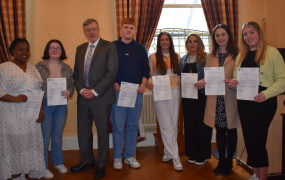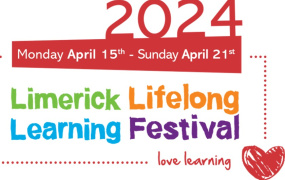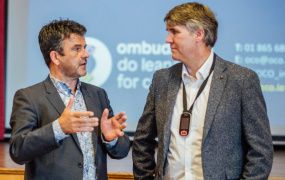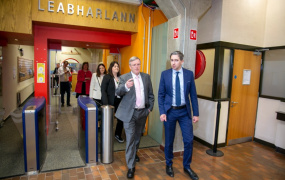GRACE Project
Overview
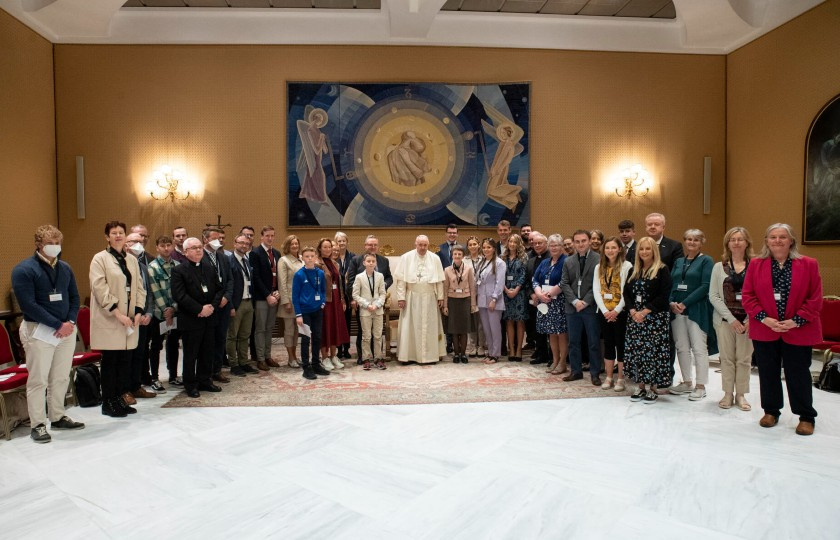
Global Researchers Advancing Catholic Education (G.R.A.C.E.) is an international research-based partnership between scholars in Mary Immaculate College Limerick, Boston College, United States, the University of Notre Dame Fremantle, Australia, and St Mary’s University in Twickenham, London. University of Glasgow, Edith Cowan University, Australia. GRACE also works in partnership with OIEC (International Office of Catholic Education). As an emerging community of practice (Wenger, 2000), G.R.A.C.E. provides an original opportunity for scholars of Catholic education and theology in our respective countries to affirm, study, collaborate, and respond meaningfully to challenges we face in the field.
Toward this end, our initiative:
- Seeks a deeper study of ecclesiology and Christian anthropology and its significance for Catholic education
- Pursues new theories of Catholic education based on empirical research
- Strengthens a global argument for the importance of faith-based schools in a plural society
- Attunes educators’ abilities to notice, engage, and celebrate the presence of God’s grace in the world
- This partnership promotes research and learning to develop the head, heart, and hands of Catholic education.
The project in Ireland is led by:
Notre Dame University, Australia
Dr. Christine Robinson, Senior Lecturer, Early Childhood Degree Coordinator
Email: Christine.Robinson@nd.edu.au
Roche Centre for Catholic Education, Boston, USA
Dr Melodie Wyttenbach, Executive Director
Email: Wyttenba@bc.edu
Dr. Michael O'Connor, Program Director of Outreach & Professional Development
Email: OConnooq@bc.edu
Fr. Gilbert Ezeugwu, Doctoral Student, Curriculum and Instruction
Email: Ezeugwu@bc.edu
St Mary's University, London
Prof. John Lydon, Catholic School Leadership
Email: John.Lydon@stmarys.ac.uk
Dr Caroline Healy, Lecturer in Educational Leadership and Management
Email: Caroline.Healy@stmarys.ac.uk
Glasgow University
Prof. Roisín Coll, Professor of Catholic Education
Email: Roisin.Coll@glasgow.ac.uk
Edith Cowan University
Dr Linda Cranley, Senior Lecturer
Email: L.Cranley@ecu.edu.au
International Office for Catholic Education
Hervé Lecomte, General Secretary
Email: H.Lecomte@laprovidencefecamp…
Along with: Dr. Quentin Wodon, Director of UNESCO IICBA
Email: Rotarianeconomist@gmail.com
Research
Identity and Ethos in Catholic Primary & Secondary Schools in Ireland: Exploring the Attitudes and Behaviours of Stakeholders
Overview of GRACE (Ireland)
Research Project and Summary of Findings and Recommendations
Report 1
Leaders and Staff in Catholic Schools in Ireland: Demographics and Religious Profile
Profile of Participants
For information on the profile of participants, please click here.
Report 2
Stakeholders in Catholic Schools in Ireland: Training, Knowledge and Support
Report 3
Commitment to Faith Development & Religious Practice in Catholic Schools in Ireland
Report 4
Principals as Leaders of Identity and Ethos in Catholic Schools in Ireland
Report 5
Religious Education as an Expression of Identity and Ethos in Catholic Schools in Ireland
Report 6
Catholic Schools in Ireland: Responsibility, Oversight and Governance
Methodology
For information on the methodology, please click here.
In 2020, a team of researchers at MIC, Professor Eamonn Conway, Dr Eugene Duffy and Dr Dan O’Connell, initiated a research project aimed at establishing a clear baseline and a set of signposts for the advancement of value-led Catholic education – in diverse settings – in the Republic of Ireland. Dr Brendan O’Keefe was invited to join the team as an independent consultant. It was determined that a budget in the region of €200,000 would be needed and as no funds were available internally, this would have to be generated entirely from external agencies. These funds were generated between 2021-2022, enabling the hiring of two researchers at post-doctoral level to assist with the project. Dr. Catherine McCormack started May, 2021and Dr. Donna Doherty in April 2022.
The research project is co-funded primarily by the following bodies:
- The All Hallows Trust
- The Presentation Sisters SE & NW
- The Irish Jesuits
Significant funds were generously provided by these and other bodies for additional G.R.A.C.E projects. Dr Dan O’Connell became the research project’s Principal Investigator in 2022. This followed the retirement of Dr Eugene Duffy from MIC, and the departure of Professor Eamonn Conway from MIC’s Department of Theology & Religious Studies to take up the Chair of Integral Human Development at the University of Notre Dame Australia in 2022. However, Prof. Eamonn Conway remained as part of the research team.
In early to mid-2022, surveys were sent to all boards of management, principals, teachers, religious education teachers and other staff (secretaries, special education teachers, etc.) in both primary and secondary schools in the Republic of Ireland under Catholic patronage.
The relatively high level of responses, numbering almost 4,000, mean that this is the largest ever data gathering exercise in regard to the realities of Catholic education in the history of the Irish State.
In mid-2022 we pilot-shared some preliminary insights from the data with the projects’ donors as well as with a small number of key stake-holders in order to confirm and ‘test-drive’ some of the findings and to seek guidance on how to proceed with analysis and presentation.
In order to assist with the analysis and writing up of the data, Dr. Amalee Meehan (Mater Dei Centre for Catholic Education, DCU) joined the research team and wrote up two reports. Dr. Eugene Duffy returned and also assisted in this process and wrote up the report on governance and accountability.
The reports were launched in DCU, The All Hallows Campus by Bishop Niall Coll, April 23rd, 2024.
Research Team
Dr Daniel O’Connell is a lecturer in Religious Education at Mary Immaculate College, Limerick. He is the chair of the international Global Researchers Advancing Catholic Education (G.R.A.C.E.) project. He has co-written religious education text books for American high schools and Catholic primary schools in Ireland (the Grow in Love series). His research interests are concerned with the nature and purpose of Catholic education, faith-based education in a pluralistic society and the public significance of the Christian religious tradition.
Father Eamonn Conway is a priest of the archdiocese of Tuam and Head of Theology & Religious Studies at Mary Immaculate College since 1999. His research interests are related to the works of Karl Rahner and Hans Urs Von Balthasar; faith and culture, especially the interface between culture, technology and religion, and the profile and status of theology at third and fourth levels.
He has supervised PhD dissertations in a number of areas including the physicality of pilgrimage, religious faith and its significance for principals in Catholic schools, mindfulness and its compatibility with Catholic ethos. He is a co-founder of the G.R.A.C.E. Project.
In October 2022, he will be leaving Mary Immaculate College to take up the position of Professor of Integral Human Development at the School of Philosophy & Theology, University of Notre Dame Australia, one of the partner-universities in the G.R.A.C.E. project.
Dr Donna Doherty joined the G.R.A.C.E. project as a postdoctoral researcher in May 2022.
Prior to taking up her role in Mary Immaculate College, she was a lecturer in religious education at St. Angela’s College, Sligo, and has worked in an adjunct capacity in pastoral supervision at St. Patrick’s Pontifical University. She has a long-standing editorial background in religious book publishing and religious affairs broadcasting and has commissioned and contributed to the editing of over 600 books related to Catholic theology, Christian education and catechetics. She was the first lay school chaplain to be employed in the Northern Ireland post-primary Catholic education sector.
Her research interests include lifelong religious education in the formal and extra-formal spheres, Catholic education, adult religious education, women’s spirituality and faith development, religious book publishing and school chaplaincy.
Dr Eugene Duffy is a priest of the Diocese of Achonry, currently Episcopal Vicar for Pastoral Renewal and Development. He is a former lecturer in Theology and Religious Studies at Mary Immaculate College, University of Limerick. His principal research area is Church structures and polity. He is a member of the Peter and Paul Seminar, an international research group of theologians, canonists and ecumenists, addressing issues of ecclesial reform.
He established and coordinated the MA in Christian Leadership in Education programme at Mary Immaculate College and was a founding member of GRACE (Global Researchers Advancing Catholic Education).
His publications include: Catholic Primary Education: Facing New Challenges (2012), The Restructuring of Irish Dioceses, (2022).
Dr Catherine McCormack was appointed as postdoctoral researcher for the G.R.A.C.E. project in May 2021.
Catherine worked as a Faith Leadership and Governance coordinator with C.E.I.S.T. (Catholic Education an Irish Schools Trust) prior to taking up her role in Mary Immaculate College, Limerick. Before that Catherine was part of the staff of St Patrick’s College in Thurles (now part of MIC). as a lecturer in education and as school placement coordinator.
Catherine’s research interests include the identity of Catholic schools, the standards within non-exam Religious Education at second level and accountability around ethos in Catholic schools.
Amalee Meehan (PhD, Boston College) is a faculty member at the Institute of Education, Dublin City University (DCU). An Associate Researcher at the Mater Dei Centre for Catholic Education (MDCCE) and the National Anti-Bullying Research and Resource Centre (ABC), both at DCU, Amalee also serves as a director of the Catholic Education Partnership.
Dr Brendan O’Keeffe is a human geographer and social scientist with a practitioner background in rural development. He is an independent consultant working in the fields of social research, local development, community planning, evaluation, project management and organisational change. As an academic, he was a senior lecturer in geography and director of quality in Mary Immaculate College, University of Limerick.
Brendan’s current work mainly involves the use of action-research methodologies, and he is working with a number of community groups, local development companies and local authorities. He is also engaged in a number of academic endeavours, and he has compiled research reports on several issues including youth needs, spatial planning, homelessness, community planning, cross-border collaboration, good governance and rural development. He is an active volunteer in his own community.
Events
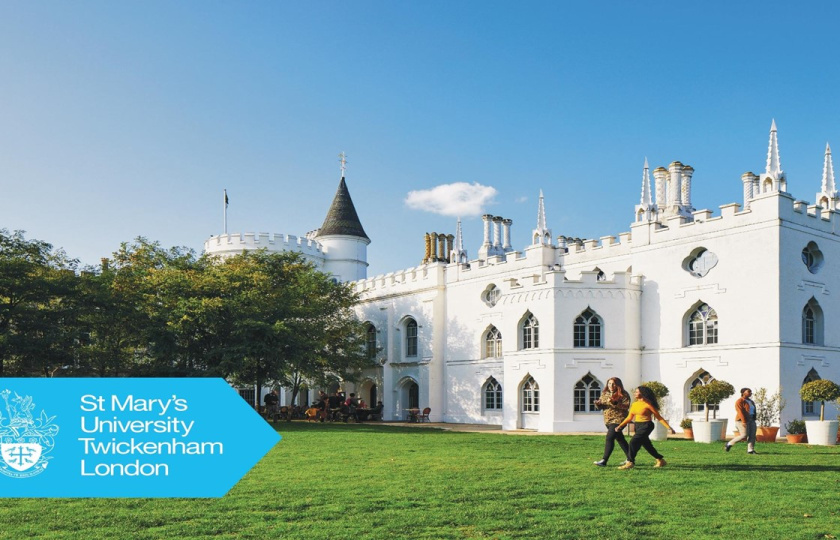
The next GRACE international conference will take place in St. Mary's University, Twickenham, London - June 2025.
For further information please contact:
Professor John Lydon, John.Lydon@stmarys.ac.uk
Dr Caroline Healy, Caroline.Healy@stmarys.ac.uk
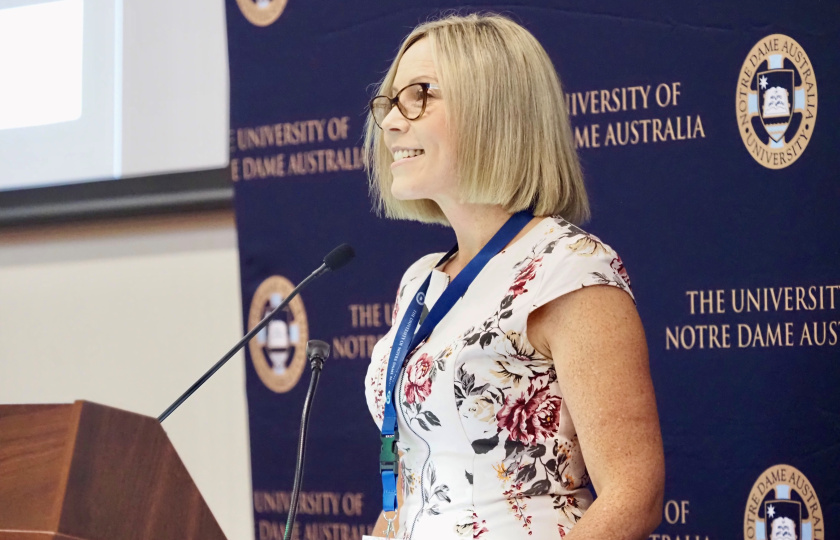
Colloquium examines future of Catholic education
The University of Notre Dame Australia hosted the inaugural Global Researchers Advancing Catholic Education (G.R.A.C.E) Research Colloquium at its Fremantle campus from January 17 – 19.
High-level researchers, educators and directors working in the Catholic system travelled to Fremantle from around the world for the three-day event.
Together they explored the challenges and opportunities for Catholic education under the theme ‘Head, Heart and Hands: Together in Faith’ – a theme Pope Francis recently highlighted when talking about educators as community builders.
The 90 participants heard from emerging and established scholars about their research, and were encouraged to collaborate and reflect with the aim of translating research into practice.
The event included a mass celebrated by Archbishop of Perth, The Most Reverend Timothy Costelloe, who also delivered a lecture on formation and service in Catholic education.
Senior Lecturer from Notre Dame’s School of Education, Linda Cranley, said the research colloquium spanned the broad spectrum of head, heart and hands, delving into topics ranging from policy and curriculum, to the formation of teachers and faith in action.
“In our modern world, strengthening Catholic education requires a creative, integrative response, a platform for thought-leaders, educators, theologians and researchers to gather and engage in new ways,” she said.
School of Education Associate Professor Christine Robinson said the event recognised Catholic education as a global topic, with shared challenges and opportunities that are experienced around the world.
“The research colloquium is a world-first event,” she said. “Nothing has ever been done like this before looking at real practical faith formation at a global level.”
G.R.A.C.E. is a long-term research-based partnership project between the University of Notre Dame Australia, The University of Glasgow, Mary Immaculate College Limerick in Ireland, Boston College in the US, St Mary’s University Twickenham in England and the International Office of Catholic Education in Rome.
The partnership brings together researchers and practitioners to facilitate research that will improve the quality and contribution of Catholic education around the world.
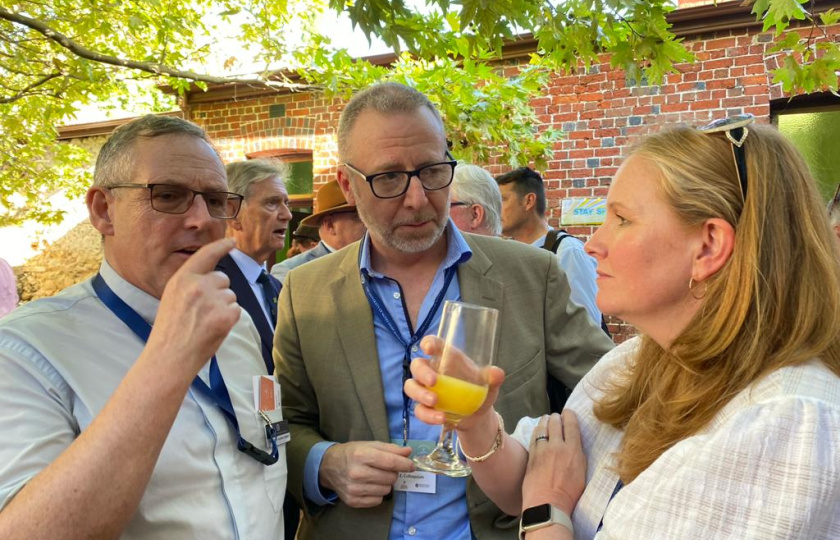
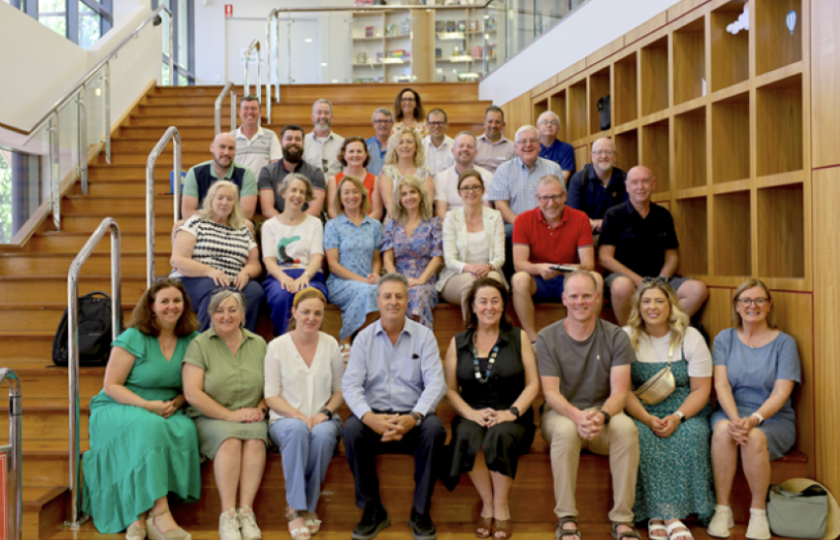
GRACE (Ireland)/ACE (Ireland) Study Symposium to Western Australia
In January 2024, Dr. Dan O’Connell, along with Dr. Catherine McCormack (TRS) and Angela Mitchell (ACE Ireland) organised and led a group of 26 educators from Ireland (North and South) to Western Australia for a two week study symposium. The journey sought to: learn from international best practice in the provision of Catholic education; explore the challenges and opportunities in promoting a holistic approach to education in Ireland and build communities of practice among educators in Ireland. The group was made up of leaders from various Catholic educational organisations, such as CPSMA, the Bishops’ Conference, Catholic Education Partnership (CEP), JMB, Ceist, Le Cheile, etc. There were also eight emerging leaders in the group, principals from primary and secondary schools. The group worked with Catholic Education Western Australia (CEWA). This group is responsible for the provision of Catholic education, primary and secondary, in four diocese across Western Australia. The group also participated in the inaugural GRACE conference at Notre Dame University, Fremantle. The symposium concluded with two days of facilitated planning for the future. Since returning, a national task force has been established to implement the learning from the trip.
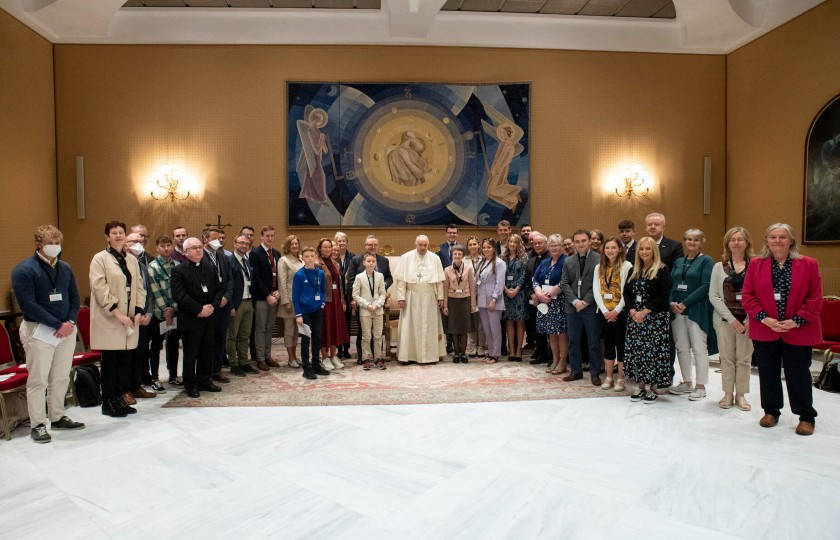
With the generous support of the Porticus Foundation, 34 Catholic educators from both Northern Ireland and the Republic were able to participate in an intensive Study Week at the Villa Palazzola outside Rome in Easter 2022. Participants were drawn from a cross-section of teachers, researchers, lecturers, trustee body members, and others in Catholic educational leadership, whether active at primary, secondary and third level, as well as postgraduate students and emerging scholars.
The purpose of the visit was to build a national network of those committed to Catholic education for the 21st century, that would sustain, energise and connect participants to one another and improve their continuing contribution and commitment to Catholic education. While in Rome, we reflected on our experience of Catholic eduation in Ireland today. These conversations were informed by presentations from members of the group regarding what is working well in their world of education.
We reflected on the importance and significance for our work of Fratelli Tutti (2019), where Pope Francis invited us to ‘dream, then, as a single human family, as fellow travellers sharing the same flesh, as children of the same earth which is our common home, each of us bringing the richness of his or her beliefs and convictions, each of us with his or her own voice, brothers and sisters all’ (#8).
However, the day that had the deepest impact on us, prompted the most conversation and reflection among the group was when we met Pope Francis in private audience for over thirty minutes. He spoke to us about the importance of education and used the metaphor of the relationship between the roots of a tree and its branches. The roots are the source and are essential. He said ‘Without roots, there is no moving forward. It is only through roots that we become people: not statues in a museum, like certain traditionalists, who are cold, stiff, rigid, who think that being prepared for life means living stuck to the roots. This relationship with one’s roots is necessary, but we also need to move forward. And this is the true tradition: taking from the past to move forward. Tradition is not static: it is dynamic, aimed at moving forward’. He spoke of the tension between risk and security in education. At the end of the meeting, he came around the group, met everyone individually and give us all a rosary beads each.
Every person in the group was profoundly moved by our meeting with the pope. One the same day we also met Dr Melanie Rosenbaum in the Dicastery for Catholic Education, where we learnt about the work of the Dicastery and the importance of the Global Compact on Catholic Education (2019).
We then went to the Irish College, where we had a very moving and insightful input from Sr Pat Murray IBVM, Executive Secretary of the International Union of Superiors General (IUSG). She spoke to us about the importance of our roles as “dream 5 keepers, life-lifters, seed sowers, and companions” journeying with those in our care. Our day finished with a visit to the Basilica of San Clemente. While we studied together, we also prayed with one another each day, nourishing our faith and deepening our relationships with one another. In the words of one of the participants, ‘The most important thing which took place there, in my estimation, was having the space to be able to engage with like-minded people in this kind of dialogue and forge connections moving forward from here’.
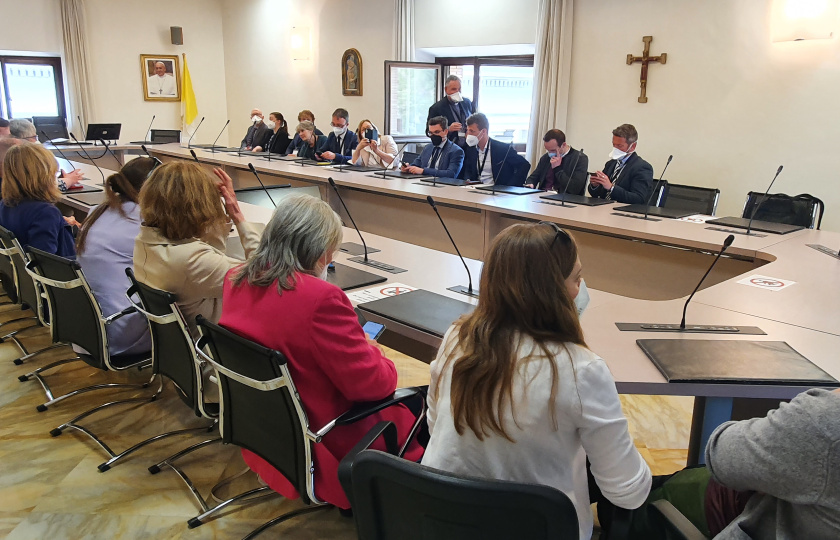
Online Lenten Reflection groups have emerged as a feature of the project, including reflection on scriptural texts as well as spiritual reading. We have had teachers from primary and secondary schools, those in third level, from Ireland, England and Scotland. This has included, among others, study of Morality: Restoring the common good in divided times by Rabbi Jonathan Sacks, Tom Groome’s What makes education Catholic? Also, I want you to be, by Thomas Halík and The message of mercy by Amalee Meehan.
Throughout 2022, G.R.A.C.E. members participated in a series of international webinars:
February
Josephine Shamwana-Lungo Preparing New Leaders in our Catholic Schools: Passing on the Charism Leadership Baton to Lay School Principals in Zambia;
Dr. Melodie Wyttenbach & Dr. John Rogers Effective Tools for Change Management for Catholic School Leaders;
Dr. Augusta Muthigani and Angela Mitchell Leading School Ethos Transformation in Kenya.
April
Dr. Catherine McCormack (MIC) and Dr. P.J. Sexton (DCU), Identity, Ambiguity and Professionalism: Dilemmas for the Diocesan Adivsor in the Republic of Ireland.
Dr. David Kennedy (DCU) & Dr. Sandra Cullen (DCU), So, Is It True? Time to Embrace the Hermeneutical Turn in Catholic Religious Education in the Republic of Ireland.
Dr. Bernadette Sweetman (DCU) Reimaging Adult Religious Education and Faith Development in a Detraditionalised Ireland.
May
Dr. David Torevell (Liverpool Hope University) & Michael James Bennett (Liverpool Hope University) The Naked Truth: Temptation and the Likely ‘Fall’ of Catholic Education.
Dr. Daniel O’Connell (MIC), Kate Liffey (St. Brendan’s Community College) & Dr. Amalee Meehan (DCU) RE-Presenting Christian Tradition as a Source of Inspiration and Integration for Educators in Catholic Schools – A Proposal.
Dr. David Fincham (St. Mary’s University) Life to the Full: Sustaining the Catholic Curriculum.
June
Prof. John Sullivan (Emeritus Professor Liverpool Hope University), Catholics, Culture and the Renewal of Christian Humanism.
Prof. Didier Pollefeyt (KU Leuven) Teaching the Unteachable or Why Too Much Goiod is Bad. Religious Education in Catholic Schools Today.
Dr. Richard Rymarz (The Australian Institute of Theological Education) Utilizing Authenticity: Options for Catholic Education in a Particular Detraditionalized Cultural Context.
Prof. John Lydon (St. Mary’ University) The Perennial Impct of Salesian Accompaniment in a Context of Detraditionalisation.
See Religions website for many of these papers.
Publications
See below for articles that emerged from GRACE webinars on religion and detraditionalisation and these have been published in a special issue of Religions entitled: Catholic Education in Detraditionalised Cultural Contexts
In a recent article, Didier Pollefeyt reflected on the worrisome observation that young children seemingly successfully raised in the Christian faith in Catholic schools lose this faith by the end of secondary education. According to him, the combination of an all-too-positive theology and positive psychology in primary schools (turning these into safe havens) should be complemented by theologies of vulnerability and responsibility in order to present a Christian faith that is able to assist youngsters in situations of conflict, suffering, etc. In this contribution, however, I argue that a more fundamental analysis is to be made to solve this problem, not only for pedagogical but especially for theological reasons. A theological recontextualisation in dialogue with the current context will show us that the interruption of (all too) positive theologies urges these theologies themselves to change from within, into theologies of interruption. After summarising Pollefeyt’s argument, I will analyse the current context of detraditionalisation and pluralisation, pointing to the challenges it poses to all identity construction (including Christian identity construction) that are to be interrupted by difference and otherness. Afterwards, I will shed light on the precise way in which the dynamics of negative theology foster a radical critical hermeneutical consciousness at the heart of the Christian faith, challenging any attempt at solidifying it within closed, self-securing narratives, and thus opening up these narratives to be interrupted. I will illustrate my point with a short reflection on the Gospel of Mark as a Gospel for our times. In the conclusion, I will apply the insights gained to the project of the Catholic dialogue school in order to prevent the counterproductive outcome of self-securing identities.
Fincham, D. (2021) ‘Life to the Full: Sustaining the Catholic Curriculum’, Religions, 12(11), 983;
Catholic schools. has articulated There are concerns that the curriculum of Catholic schools has been increasingly dominated by pressures to conform to a programme of education legitimised by an intrusive secular state and designated as a ‘national curriculum’. Accordingly, the curriculum of Catholic maintained schools is regulated within a standardised framework that is directed by government. Contentiously, it has been asserted that, as a result, the curriculum in Catholic schools in England has effectively been ‘de-Catholicised’. This claim has been contested. For example, it is maintained that the matter is more nuanced than this and the situation cannot be interpreted in such an unequivocal way. However, it might well be asked: what should a Catholic curriculum look like? In the face of this question, leaders in Catholic schools are encouraged to consider renewing and restoring a distinctive curriculum by permeating it systematically with the principles of Catholic social teaching. Ultimately, the writer argues, the curriculum of Catholic schools should provide students with an understanding of the teachings of Jesus Christ.
A key challenge for educational provision in the Republic of Ireland has been the need to develop appropriate approaches to religious education that are effective in terms of meeting the needs and rights of students in a democratic pluralistic society. At the centre of such discussions, although rarely explicitly recognised, is an attempt to grapple with the question of truth in the context of religious education. This paper argues that religious education, in attempting to engage with this evolving context, is challenged in two trajectories: (a) by approaches that operate from the presumption that objective truth exists and (b) by approaches that are sceptical of any claim to objective truth. It will be argued that proposals, such as those offered by active pluralists, to deal with religious truth claims in religious education are limited in terms of their capacity to adequately treat such claims and the demands that these carry for adherents. This paper argues for a hermeneutical treatment of the context for Catholic religious education in the Republic of Ireland, which is considered under the following headings: (1) irruptions from the periphery, (2) the theological matrix, (3) the status of religion, and (4) the position of students and teachers in religious education classes. From this it will be suggested that promoting religious education as a hermeneutic activity allows for a respectful engagement with competing truth claims.
This article will begin by referencing briefly the notion of detraditionalisation—referencing scholars such as Lieven Boeve, who has written extensively on the issue. By way of contrast, accompaniment constitutes a perennial theme in a Christian context, best encapsulated in the Emmaus story (Luke 22:13–35), when Jesus accompanies the two disciples on what could be described as a journey of discovery. This journey paradigm, which underpins many religious education programmes, constitutes a central feature of the Salesian education vision known as the Preventive System. St John Bosco (1815–1888), the founder of the Salesians, was concerned with the transformation of the lives of every young person with whom he came into contact, resonating with ‘the uniqueness of the individual’, one of the key principles of Catholic education. According to one of his first Salesians, Bosco encouraged them to ‘go to the pump’, to meet young people where they had gathered and to engage in a genuine encounter. This article will explore the extent to which this model of effective presence and encounter reflects, firstly, Jesus as the Shepherd and, secondly, the vision of St John Bosco which involves the teacher/pastoral worker and the accompanied meeting each other and having frequent encounters in informal ways in a variety of environments, marked by openness, trust and availability. Research will be retrieved to exemplify the perennial impact of Salesian accompaniment in Salesian secondary schools in England in which students are, in general, familiar with the Christian faith and its central tenets.
A significant challenge facing leaders of Catholic schools in Ireland today is to ensure an appreciation for, and understanding of, the Catholic identity of the school among members of staff. A first aim of this research project was to create a ‘vital idea’ to re-present Christian faith to people working in Catholic schools, in a way that might resonate with the real world of teaching and learning and with their own lives. Drawing from Fratelli Tutti), we used the phrase ‘A Love that impels towards communion’ as the ‘vital idea’. A second aim was to present it to principals of second-level Catholic schools and garner their responses to it. We did this with twelve principals, using a focus group methodology. We first explained the thinking behind the ‘vital idea’, and then gathered their responses to it. The reaction of the principals was favourable. It made sense to them personally and chimed with much of what they are doing professionally. However, the word ‘communion’ was found not to be helpful. A further finding relates to values: while the values in the ‘vital idea’ were embraced and talked about easily, there was little explicit reference to God, the source of those values.
This article deals with the strong disaffiliation of Church and Catholic faith we see in the Western world, especially when students go from primary to secondary school, and when leaving the Catholic educational system. Based on empirical data, the hypothesis is formulated that Catholic schools use a pedagogy that is too much concerned with positive theology and psychology, an approach that does not stand the test when life shows its complexities and vulnerabilities. The article presents theologies and pedagogies of responsibility and vulnerability as a complimentary approach, rooted in the Catholic tradition, as a possible way to form more resilient believers and citizens for the future.
This paper addresses some conceptual options for Catholic education in a particular cultural context. This context is where the Catholic school system is large, stable, and well established but in the wider cultural context, the place of religion in society is detraditionalized. This detraditionalization is reflected in Catholic school enrolments where increasing numbers of students come from non-Catholic backgrounds, where, amongst Catholics, engagement with traditional structures is low or where there is no religious association at all. To initiate discussion a simple dichotomy is introduced; do Catholic schools promote religious identity or do they address a wider demographic by stressing harmonized common values and policies? To elaborate on this initial position several conceptual perspectives are offered. A key discussion point centres around the human community of Catholic schools and how they align with the various options that are proposed.
A deficit in empirical studies regarding the role of the Diocesan Advisor at second-level schools in the Republic of Ireland prompted research in this area. The findings of a study carried out by the authors are outlined in this article. Perspectives of 19 Diocesan Advisors were gathered qualitatively. The concept of “visible” and “invisible” maps provided a framework. In Ireland, State inspection relies on visible mapping of inspection processes that are accessible to all stakeholders. The Diocesan Advisor, on behalf of the bishop, uses invisible maps, observing how the school is living out its Catholic remit and how religious education is carried out within the curriculum. The study identified that the role is under-resourced and lacks clarity, resulting in a widespread deficiency in the monitoring of Catholic schools’ identity and the non-examinable religious education currently on the curriculum. The study further revealed an uncertain future for the role of the Diocesan Advisor in a changing landscape. A discussion on the implications of the findings is included, and possible options for the role in the future are explored.
The culture of provision of adult religious education and faith development, whereby talks or courses are made available at parish level and/or in formal educational settings, has undoubtedly dominated the Irish scene for many years. The low level of uptake of such opportunities or long-term engagement, however, coupled with the recognised decrease in regular church attendance would suggest that this culture of provision does not meet the needs of the adult population. This mismatch was a key driving force behind the inception of the Adult Religious Education and Faith Development (AREFD) project. Cognisant of cultural and societal changes, a core aim of the project was to assess this traditional culture of provision within a detraditionalised context. The present study is based on data gathered in phase two of the AREFD project consisting of fourteen semi-structured interviews and focus groups conducted between December 2019 and April 2021. The participants were involved for a number of years in adult religious education and faith development in both the Republic of Ireland and Northern Ireland and across a variety of settings. The purpose of these interviews was to gather together the rich insights from the wealth of experience of the interviewees on the practicalities and possibilities central to adult religious education. The findings affirm dissatisfaction amongst participants with the current state of AREFD in Ireland, but indicate that there is hope for the future. Fresh and innovative engagement with adults is called for. This paper outlines key themes emerging from the data which contribute to the conversation of how innovative engagement with adults can revitalise church culture in Ireland.
This article highlights one likely ‘fall’ to which Catholic education is susceptible in the modern era due to the oppressive climate in which it operates. Our critical method in arguing for this position is to oscillate between two texts—one written and one visual: Genesis 3: 1–18 and Masaccio’s painting of ‘The Expulsion’. The hope is that one will inform and enrich a deeper understanding of the other. As part of this exercise in creative hermeneutics, we first argue that the dramatic story of the fall through pride or amor sui (self-love) and its resultant feeling of shame is a universal one in which readers (listeners) glimpse the long history of their own fears and desires. Second, we show how one 15th century Italian painter represented the tragic consequences of the Faustian self by examining Masaccio’s painting in some detail. Third, we investigate St. Augustine’s writings on this narrative and suggest how some forms of self-elevation align dangerously with the promotion of the autonomous self in contemporary education. We also critically examine exegetical writings from Jewish and Christian perspectives to draw out further meanings of the narrative. Fourth, we point to the themes of hiding and forgiveness embedded in the account which leads us neatly into the last fifth section where we discuss the text’s implications for contemporary Catholic education. Here, the focus is on one likely ‘fall’ of Catholic education when it fails to live up to its distinctive mission to place love unconditionally at its centre. In a highly market-driven, managerial climate of competition where league tables, bureaucratisation, and data analysis assume an overwhelming significance allied to institutional survival and kudos, the temptation is to show the worth of the school by emphasising its examination success and employment rates rather than through its service to others, especially those who have been forgotten. Although we are highly sensitive to the conflictual demands on Catholic institutions at the present time from a variety of stakeholders, we conclude that their healthy continuation depends on their public, ethical avowal to love everyone unreservedly with assistance from God’s grace and when this aspiration fails, to seek forgiveness. The article is not concerned with strategies of resistance against those developments in education contrary to a Catholic philosophy.
Robinson, C., Cranley, L., & O’Connell, D. (2023) ‘The journey to G.R.A.C.E: Creating an international community of practice’, Religions, 14(1), 43,
GRACE MA and PhD Students
Alex McKillican was the first awardee of a G.R.A.C.E Project PhD scholarship, appointed in September 2020. He is examining the Christian elements in the pedagogy of Paulo Freire in dialogue with the Christian existentialism found in the work of John Macquarrie. This research is a previously unexplored topic in Irish adult education and Catholic education, and is under the joint supervision of Dr Tom Finegan (MIC) and Dr Jones Irwin (DCU).
Claire Considine is one of two All Hallows Trust PhD scholarship recipients. She is investigating “Spiritual Well-being: Its nature and place in Irish Post Primary Schools. Educator’s views on Spirituality and Spiritual Well-being in Education” with Dr Dan O’Connell as her supervisor.
Joanne Ferguson is the second All Hallows PhD scholar and is researching ‘Assessing the value of New Media in creating Prayer opportunities for Primary School children in Ireland’ under the supervision of Dr Éamonn Fitzgibbon.
Several Fee Bursaries, funded by the Presentation and FCJ Sisters, have been awarded to candidates in the MA in Christian Leadership in Education programme.
- Overview
- Research
- Events
- Publications
- GRACE MA and PhD Students



